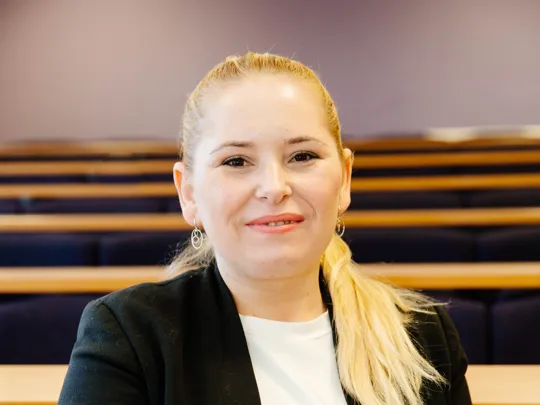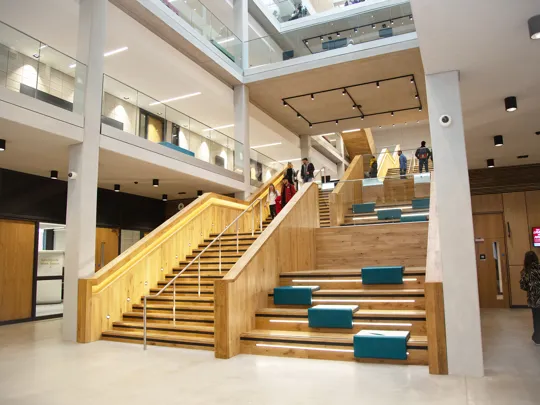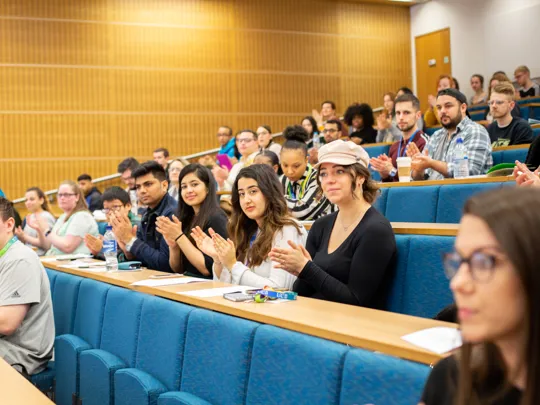of graduate employers say relevant experience is essential to getting a job with them
Why choose this degree course?
- SPECIALISE YOUR STUDIES – From Mental Wellbeing to Learning Disability or Criminology, choose from our optional modules to tailor your learning
- WORK PLACEMENT – Gain valuable real-world experience by undertaking a work placement as part of your top-up course
- IN-DEPTH RESEARCH – Carry out your own in-depth research project on a topic that interests you and is relevant to your career aspirations
- EXPERT TUITION – Receive support and teaching from expert staff with a wealth of vocational experience in the health and social care sector
- AWARD-WINNING UNIVERSITY – Study at the highest-ranking university in the region according to student choice (Whatuni Student Choice Awards 2023)
Our facilities
Our learning spaces at University College Birmingham ensure you have the right environments to build your knowledge, from lecture theatres to interactive group working spaces and extensive library resources.
Course breakdown
- Modules
Core Modules
Counselling and Guidance Skills
From informally giving advice and information to a more in-depth addressing of emotional issues, counsellors support others in a wide range of capacities. You will develop an understanding of the use of counselling, its practicalities, the necessity of self-development and boundaries as well as essential skills.
Leadership and Management in Health and Social Care
Studying on this module you will develop your skills and understanding of leadership and management in health and social care settings. You will undertake a range of tasks which will culminate in you to creating a leadership and management portfolio. These tasks will develop your skills, so that you become a more effective practitioner, better equipped to lead and manage in the current professional field.
Choose 2 optional modules
Criminology and Offender Management
This module provides students with an introduction and overview of offender rehabilitation and the core principles of offender management that underpin the offender's journey through the criminal justice system. It also explains interventions to motivate them to stop offending. This will include concepts of offender need, core principles of offender management and the practice of managing different offender groups
Learning Disability
You will develop your knowledge and skills in supporting individuals with learning disabilities. You will gain an informed perspective on past and present issues and examine the policies and theory behind the service. You will learn strategies for supporting people with complex needs as well as the role and responsibilities of practitioners in leading and developing practice.
Mental Wellbeing
This module will raise your awareness of mental health issues within society. It will enhance your understanding of historical context and the development of policy and practice in relation to mental wellbeing.
Choose 1 optional module
Research in Health and Social Care Practice
You will have the opportunity to deepen your knowledge within a chosen area of the course and the related industry. Using your creativity, problem-solving abilities and data analysis techniques, you will communicate the application, management of research and appraisal of your chosen area under the supervision of an experienced tutor.
Research Project (SEHC)
You will develop your independent learning, problem solving and analytical skills by choosing a particular area of the course and related industry to study in greater depth. You will be encouraged to integrate concepts and knowledge from previous modules and draw on wide range of academic and industrial resources, supported by a lecturer within personal tutorials.
The modules listed above for this course are regularly reviewed to ensure they are up to date and informed by industry as well as the latest teaching methods. On occasion, we may need to make unexpected changes to modules – if this occurs, we will contact all offer holders as soon as possible.
Entry requirements
Entry requirements
Academic: A relevant HND or a foundation degree in the areas of Health and Social Care or Care in the Community, with 240 credits.
GCSE/IGCSE English grade A*-C (grade 9-4) or equivalent.
If you are unsure if your previous qualification is suitable, please contact us before completing an application. You can complete our enquiry form here or call us on 0121 604 1040
International students
Academic: European and International qualifications studied in a relevant subject matter will also be considered. Applicants will need to have achieved 120 ECTS or equivalent (European Credit Transfer).
GCSE/IGCSE English language and maths grades A*-C (grades 9-4) or equivalent.
If you are unsure if your previous qualification is suitable, please contact us before completing an application. You can call us on 0121 604 1040 or complete our enquiry form:
Key information
Teaching and assessment
Note: Indicative information only – actual timetables and assessment regimes will be issued at your induction.
Teaching
Example of a typical teaching week (up to 11 contact hours):
- Large group teaching – 5 hours
- Smaller group teaching – 3 hours
- Tutorials – 3 hours
- Field trips and visits
You will also need to commit around 20 hours per week for individual study time.
Assesment
Estimated breakdown of assessment for this degree course:
- Coursework – 80%
- Practical assessment – 20%
Our teaching and assessment is underpinned by our Teaching, Learning and Assessment Strategy 2021-2024.
Tuition fees for home students
If you are a home student enrolling on a bachelor's or foundation degree course at University College Birmingham, the 2025/2026 academic year tuition fee for full-time study is £9,535. For part-time study, the fee is £4,767.50.
Kick-Start Scheme
As a new student studying this course full-time, you will receive £300 per year through our Kick-Start Scheme (UK students only, eligibility criteria applies). This scheme will support your studies and future career by contributing to course-related materials, uniform or selected items on campus. You may also qualify for an additional £500 per year.
Find out more about the Kick-Start Scheme here.
Unibuddy Community - meet other students on your course
Starting university is an exciting time, but we understand that it can sometimes feel a little daunting. To support you, you will be invited to join our Unibuddy Community, where you can meet other students who have applied for the same course at University College Birmingham, before you start studying here.
As soon as you have been made an offer, you will be sent an invitation email to complete your registration and join the Unibuddy Community. For more information, check out our Unibuddy Community page.
Work experience
Work experience is vital for learning how to apply your training in the real world and for building your confidence and skills before you finish your course – and it may even lead to a job when you graduate. Our Hired team can help you find suitable work experience.
As part of the BSc Health and Social Care top-up course, you will complete 200 hours on work placement with one of our industry partners.
Work alongside experts in your sector
A snapshot of some of the employers we have worked with:
- Barnardo's
- Birmingham Women's & Children's NHS Foundation Trust
- Anchor Homes
- Heartlands Resource Centre
- Wilson Stuart School

I loved the look of the modules on University College Birmingham’s Health and Social Care degree course, and after having a tour of the University and seeing how helpful, approachable and friendly all of the staff were, I knew it was the place for me.
Career opportunities
The example roles and salaries below are intended as a guide only.
Family support worker
Average Salary: £21,000
Community education officer
Average Salary: £28,000
Learning mentor (school)
Average Salary: £18,750
Health promotion specialist
Average salary: £24,907 – £44,503
Community development worker
Average Salary: £28,500
Advice worker
Average Salary: £28,000

Larisa’s Story
At a pivotal life juncture, Larisa followed her calling to train to help those in need and pass on her knowledge.
Meet your lecturers









